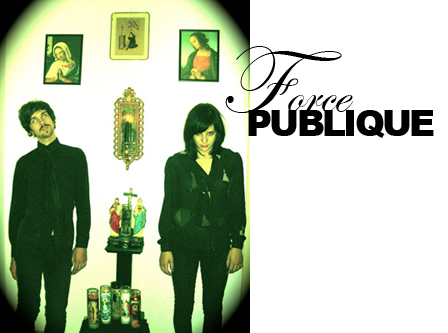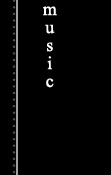




“You don’t have to be a house to be haunted. “ - Emily Dickinson These commodities are known: There is beauty in black. Grace and redemption lives in the darkened places too. Evening dropped and the lights in that room, our square world, were destroyed. A shimmery collage of film flickered at the front and then it opened: Tortured basslines started the haunt. The room began to pulse and wobble. A wall of sound bullied its way through the room turning its corners into trampolines: mercurial and intoxicating sounds of Force Publique ricocheted. It was an agonizing and gorgeous outburst. A violent and kind hollow of music. The kind in which darkness murders light. Force Publique had played Meadowlark, its rocky, uneven dungeon walls, before. But this was the first time that Alex Anderson (of ManCub) joined Cassie McNeil and James Wayne, on drums. A strobe was run by the band's friend Caitlin Lloyd (she also created some of the great visuals) and it syncopated with Anderson’s fury – his sharp cymbals of light sparkled and detonated behind McNeil and Wayne, illuminating their watery, frenetic silhouettes. Standing there, I didn’t remember to dance. It was, in truth: shocking. It was huge. What they were doing was, and is, aptly named: Dark Wave. Both words describe what I wanted to do, and silently did, for 40 minutes that night. We can see the walls when the lights are on. Turn them off and everything becomes boundless; bigger. Suddenly the universe becomes a fat woman whom you can’t wrap your arms around. The Pre-Socratic philosopher Anaximander was a proponent of the Apeiron: the boundless reservoir where opposites were created – hot/cold, light/dark – for use in world, according to necessity. Apeiron was seen to be a source of birth and destruction. Apeiron takes back what is not needed. This indefinite place, the originator of all things, was seen to be mystical. I find elegance in this simple conglomerate of ideas – because it speaks to the notion of what I felt in that room with the Force: a giving and taking of things. Simply put: I felt a divine dark wave, and holy shit is it redemptive. I remember a friend long ago remarking about how he loved his hardcore music. How it offered him a sanctuary for escape from his head. He said that with music that big, loud and bullying – he lost any time to pity himself and really swim in any sadness. The name comes from the Force Publique, the 19th/20th century army of the Democratic Republic of the Congo. Under King Leopold II of Belgium, the tyrannical army terrorized the populace with guns and bull whips made of hippopotamus hide. They bullied villagers into meeting forced labor quotas. In order to demonstrate to their King that they had been enforcing the rubber quota and not wasting bullets, they cut-off the hands of villagers. Certainly, a dark concept. But this Force, Denver’s Force Publique, this army of sound is a haunted weapon that can be wielded as an analogy. Like the Congo army, their work is in bullying people – and how to demonstrate to their King that they haven’t been wasting bullets. The analogy extends further: theirs is a sound that is what the villagers in the Congo must have felt –a desperation for something else. Yes, this Force is breathing in hushed incantations of desperation and want and need. Cassie McNeil didn’t always play this music. The dark, quiet figurine sings in hushed bursts of confidence, from somewhere further down the factory line than just the megaphone. But it wasn’t always like this. And really, it’s a difficult historical picture to wrap your eyes around once you meet her: before this project, McNeil was a blues guitar player – you know, those people that aren’t so worried about what comes out of their mouth for you to hear because they’re only interested in speaking at the world and at you through their oh-so-monstrous chops, tricky, soulful runs and vibrato and trills. But that was a lifetime ago. And you can see it in her eyes: she has been through things. There’s something that tells me she doesn’t trust me, or probably: you. You can hear it in her voice: she has seen some things she would take back. She wails like she was wounded. And yes, she feels bigger in the dark. Her voice sounds gothic: a bit terrorized and a bit sublime. This is James Wayne’s first band. January was his first time on a stage – which is impressive. Their live show has certainly taken a gigantic couple of leaps in the last couple of months, especially now with the addition of Anderson – but Wayne’s presence is surprisingly seasoned, maybe because it is, in part, sparse. Wayne was at the core of the recording and of establishing the sound and direction. His aptitude for taking their collaborative concepts and moods and dialing it in stands at the center of their production as a duo. An impressive beginning, for certain. And it has been quick: The Force have less than six months under their belt and they’ve already played some big shows. They’ve opened for local favorites Achille Lauro and Land Lines as well as nationals like Cold Cave. Local media has taken a liking to the act and daily more people don their uniform and are initiated into their army. Their songs are slinky dark things that slither around the wheels of the occultish notions of culture and consumerism. They are punctuated by factory lines of repetition: washy industrial chops and cymbals; metal things. There is a snarl in McNeil’s voice, a caveat that hisses at the recipient: don’t come to close. The darkness is like a fishing hook: it’s alluring. Even, sexy. But, come too close and it is dangerous. Caveat Emptor: you may just dance your way back into one of those corners that murders the light. Anyone who has stood in front of the deafening profundity of blackened maxims knows this all too well: Darkness begs light. This may seem remedial. Obvious. But as we also know: the profundities of existence are right before us. Like the pitch of night. Those molecules of invisible life that we breathe. These hands that we have. These forces that we feel. "Droll thing life is -- that mysterious arrangement of merciless logic for a futile purpose. The most you can hope from it is some knowledge of yourself -- that comes too late -- a crop of unextinguishable regrets. I have wrestled with death. It is the most unexciting contest you can imagine. It takes place in an impalpable greyness, with nothing underfoot, with nothing around, without spectators, without clamour, without glory, without the great desire of victory, without the great fear of defeat, in a sickly atmosphere of tepid skepticism, without much belief in your own right, and still less in that of your adversary. If such is the form of ultimate wisdom, then life is a greater riddle that some of us think it to be." - Joseph Conrad, Heart of Darkness |









